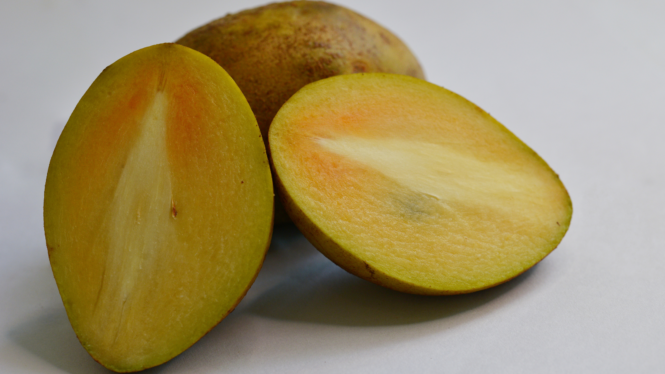- Your cart is empty
- Continue shopping

The Chiku plant, scientifically known as Manilkara zapota, is more commonly referred to as the sapodilla. Notably, this tropical evergreen tree is celebrated for its deliciously sweet fruit and its array of health benefits. Originally from Central America, it has since become widely cultivated in many tropical and subtropical regions worldwide. Consequently, this blog will delve into the chiku plant care, growing conditions and benefits of the Chiku plant. By the end, you will understand how to cultivate it successfully and why it is such a valuable addition to your garden.

Growing Conditions for Chiku Plant:
Climate Condition for Chiku Plant Care
The Chiku plant thrives in warm, tropical, and subtropical climates. It prefers temperatures between 25-35°C (77-95°F) and can tolerate slight variations. However, it is sensitive to frost and prolonged cold conditions, which can hamper its growth and fruit production. Consistent warm conditions are ideal for optimal growth.
What Is the right Soil for Sapota?
For optimal growth, the Chiku plant requires well-drained sandy loam or clay loam soils rich in organic matter. Additionally, the soil pH should ideally be between 6.0 and 8.0. Proper drainage is essential for the plant’s survival and growth alike.
Sunlight
Chiku plants need full sunlight for at least 6-8 hours a day. Adequate sunlight ensures healthy growth and maximizes fruit yield. In regions with intense summer heat, some afternoon shade can protect the plant from scorching
Watering You Chiku Plant
Regular watering is essential, especially during the initial stages of growth and dry periods. The plant requires moderate watering, ensuring the soil is moist but not waterlogged. Deep watering once or twice a week is usually sufficient, depending on the climate and soil type.
Role of Fertilization in Chiku Plant Care
Actually, the Chiku plant benefits from regular feeding with a balanced fertilizer. Organic compost or well-rotted manure can be applied to enrich the soil with essential nutrients. Fertilization should be done every 3-4 months during the growing season to support healthy growth and fruit production.
Is Pruning Important for chiku Maintence?
Pruning is necessary to maintain proper level of Chiku plan care. Not only, regular pruning helps remove dead or diseased branches and encourages the growth of new, healthy branches. It also aids in better air circulation and sunlight penetration, reducing the risk of pest infestations.
Pest and Disease Control
The Chiku plant is relatively resistant to pests and diseases. However, it can occasionally be affected by aphids, scale insects, and fungal infections. Regular inspection and the use of organic pesticides or neem oil can help manage these issues effectively.
Benefits of Chiku Plant:
Nutritional Value
Chiku fruits are rich in essential nutrients, including vitamins A, B, and C, dietary fiber, and minerals like potassium and iron. So, consuming Chiku can help boost immunity, improve digestion, and promote overall health.

Antioxidant Properties
The fruit is packed with antioxidants, which help neutralize free radicals in the body. Consequently, this can reduce the risk of chronic diseases, such as heart disease and cancer, and promote healthy aging as well.
Energy Boost
As, chiku is a natural source of fructose and sucrose, providing an instant energy boost. It is an excellent choice for athletes and those needing a quick pick-me-up during the day.
Skin Health
The vitamins and antioxidants in Chiku contribute to healthy, glowing skin. Regular consumption can help combat skin issues like acne, wrinkles, and dryness, giving you a youthful appearance.
Digestive Health
The high dietary fiber content in Chiku aids digestion and helps prevent constipation. It promotes healthy bowel movements and supports a healthy gut.
Bone Health
Chiku is a good source of calcium and phosphorus, essential for maintaining strong and healthy bones. Therefore, regular consumption can help prevent bone-related issues like osteoporosis.
Immune Support
The vitamin C content in Chiku boosts the immune system which helps the body fight infections and illnesses more effectively. It also promotes faster healing of wounds and injuries.
Chiku Farming and Seasonal Insights
Chiku farming requires careful attention to the plant’s growing conditions. Therefore, the Chiku fruit tree needs a warm climate, well-drained soil, and regular care to produce bountiful harvests. Moreover, the chiku fruit season in India typically spans from January to May and again from September to December, providing ample opportunity for cultivation and harvest.
Sapota Flower
The Sapota flower, which precedes the fruit, is an important stage in the life cycle of the Chiku plant. These small, bell-shaped flowers are white to pale yellow and emit a pleasant fragrance. Proper care during the flowering stage ensures a healthy yield of fruit.
Wrapping Up
The Chiku plant is not only a delight to grow but also offers numerous health benefits. By providing the right growing conditions you can make sure that Chiku plant care is done properly, you can enjoy the sweet, nutritious fruits of this remarkable plant. Whether you are a seasoned gardener or a beginner, the Chiku plant is a valuable addition to any tropical or subtropical garden, promising both aesthetic appeal and a bounty of health benefits. Embrace chiku plant care to enjoy the full benefits of this versatile and rewarding tree.
